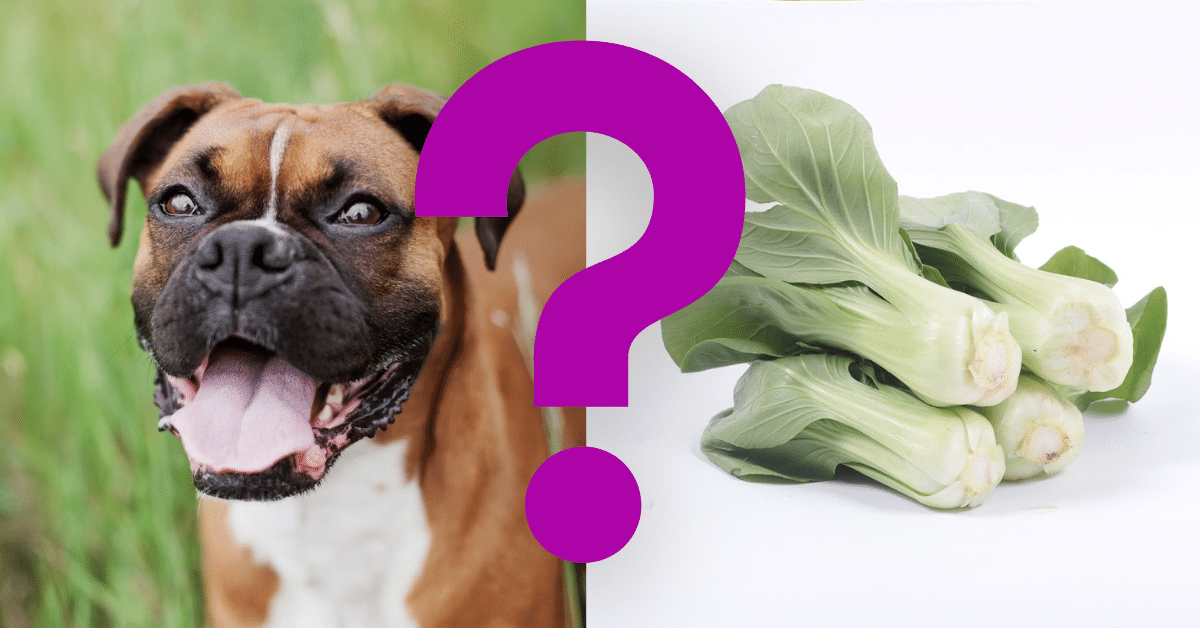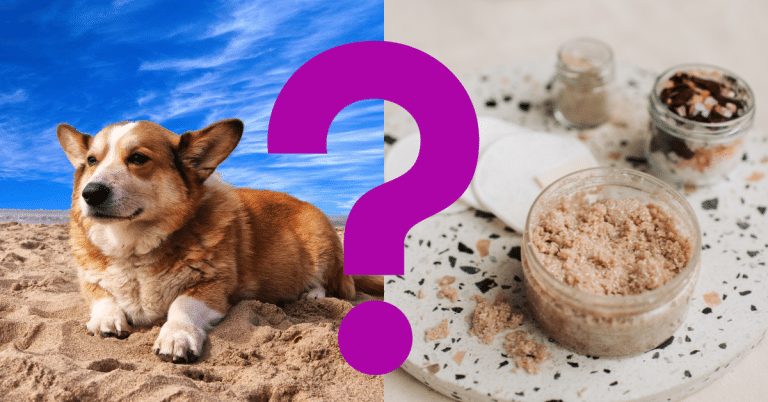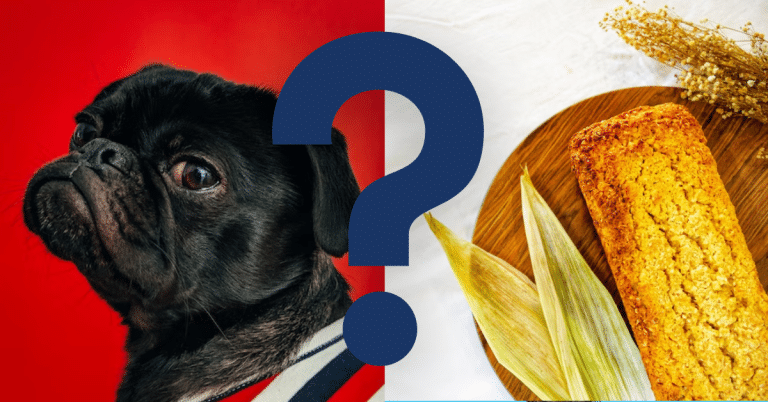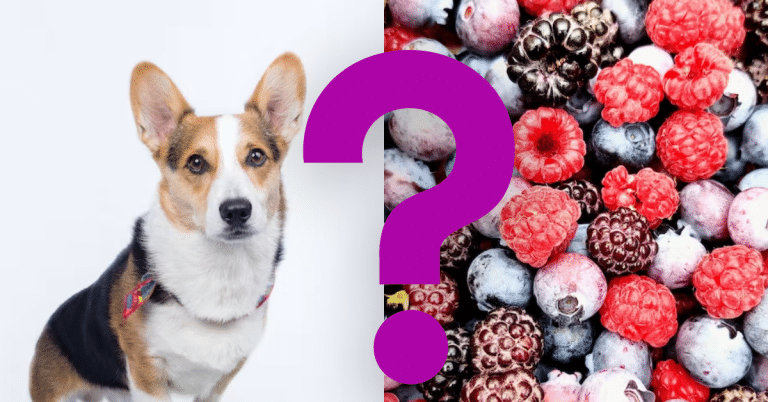Can Dogs Eat Bok Choy? A Vet’s Opinion

Bok choy is a variety of Chinese cabbage with crisp white stems and dark green leaves often used in Asian cuisine. But can you feed bok choy to your dog?
Bok choy can be eaten by dogs in moderation. It’s a low-calorie, vitamin-and-mineral-rich vegetable. It should, however, be warmed or steamed to make it simpler for dogs to consume since raw bok choy can be difficult for their digestive system. Remove any seasonings or spices before serving to your dog, and introduce them gradually to guarantee no unpleasant reactions. Because individual sensitivities vary, always check with your veterinarian before introducing new foods into your dog’s diet.
Benefits of bok choy for dogs
When consumed in moderation, bok choy can provide various benefits to dogs:
Nutrients
Bok choy is high in vital vitamins and minerals such as vitamins A, C, and K, as well as calcium, potassium, and folate. These nutrients help to maintain overall health and immunological function.
Low In Calories
Because bok choy is low in calories, it is an excellent addition to your dog’s diet for weight control and as a nutritious treat.
Fibre
It contains dietary fiber, which improves digestion and can help dogs avoid constipation.
Antioxidants
Bok choy includes antioxidants such as beta-carotene and vitamin C, which can help fight free radicals and lower the risk of chronic diseases.
Bone Health
Calcium and vitamin K help dogs have solid bones and teeth.
Eye Health
Bok choy contains vitamin A, which supports good vision and eye health in dogs.
Hydration
Its high water content can help your dog stay hydrated, especially in warmer weather.
Low Fat
Because bok choy is a low-fat vegetable, it is appropriate for dogs with dietary restrictions or pancreatitis.
However, it’s important to remember that bok choy should be prepared without flavors or spices and introduced gradually into your dog’s diet to maintain proper tolerance. Before making significant changes to your dog’s diet, always contact your veterinarian to verify it meets their health needs and any potential allergies or sensitivities.

How to safely give bok choy to dogs
Observe these instructions to give your dog bok choy safely:
Consult Your Veterinarian
Speak with your veterinarian before introducing new foods to your dog’s diet. They can offer customized guidance based on your dog’s unique nutritional and health requirements.
Preparation
To prepare, properly wash the bok choy to remove dirt or pesticides. Remove the rough stem ends since dogs may find them challenging to chew and digest. To make the bok choy easier for your dog to eat, you can cut or steam it.
Moderation Is Key
Bok choy should be given to dogs sparingly, either as a treat or as a supplement to their usual diet. It shouldn’t take the place of their regular dog food.
Plain And Unseasoned
Serve bok choy that has yet to be seasoned or is plain. Avoid adding salt, spices, or sauces since these can hurt pets. Be straightforward and organic.
Introduce Gradually And Monitor
Start with modest servings to make sure your dog will tolerate them nicely. Look for adverse side effects like diarrhea, allergies, or upset stomach. Stop feeding the bok choy if any problems occur.
Cook Thoroughly
Bok choy can be consumed by raw and cooked dogs; however, preparing it can make it easier to digest and less likely to cause stomach pain. A suggested way of cooking is steaming.
No Garlic Or Onions
Dogs are toxic to garlic and onions, so do not feed your dog bok choy recipes that contain these ingredients.
Age And Size Consideration
Consider your dog’s age, size, and health when making decisions. The food needs of puppies, seniors, and dogs with particular medical issues may differ, so modify portions accordingly.
Observation
When feeding bok choy to your dog, always keep an eye on them, especially the first few times. By doing this, you can ensure they chew it properly and don’t have any adverse effects.
Balanced diet
Bok choy should be a complementary food to your dog’s balanced diet, predominantly high-quality dog food. It should be a manageable amount of their meals.
In conclusion, bok choy can benefit your dog’s diet if given sparingly and prepared correctly. When introducing novel foods like bok choy to your dog, please speak with your veterinarian, watch how they react, and put their safety and well-being first.
Will bok choy make a dog sick?
Bok choy is generally regarded as being healthy for dogs when administered moderately and prepared appropriately, although there are certain dangers and health risks along with its consumption. Here are a few options:
Gastrointestinal Issues
When given a new diet, such as bok choy, some dogs may develop digestive problems, such as diarrhea, vomiting, or gas. It is more likely if the bok choy is poorly prepared, or the dog has a sensitive stomach.
Allergic Reactions
Dogs can get allergic to many different foods, including bok choy. Itching, skin rashes, hives, swelling, or digestive issues are all possible symptoms of an allergic reaction. If your dog has these symptoms, you should stop feeding bok choy immediately.
Choking Hazard
Bok choy can be a choking hazard if improperly prepared, especially for smaller dogs or those who don’t chew their meal well.
Toxic Ingredients
Bok choy meals with toxic components, such as garlic, onions, or other additives, might be dangerous for dogs. Bok choy should always be served raw and without any harmful seasonings.
Intestinal Blockage
Bok choy can occasionally cause intestinal blockage in dogs if they eat it in large quantities or without adequately chewing it, especially if the fibrous components are not removed.
Overfeeding
Giving your dog excessive bok choy may cause upset stomach and possible digestive problems.
It’s crucial to integrate bok choy into your dog’s diet gradually, see how they react, and make sure it’s correctly prepared, devoid of hazardous ingredients, and offered in the right size to reduce the chance of illness. Contact your veterinarian immediately if you experience any adverse effects or sickly symptoms. As individual sensitivities and dietary requirements differ, it is always prudent to consult your veterinarian before introducing new foods to your dog’s diet.
Can Dogs Eat Bok Choy Variations?
As long as it is prepared and presented correctly, dogs can often consume plain bok choy in moderation as an occasional treat or addition to their diet. However, it’s essential to consider any other ingredients and seasonings that might be utilized in various dishes regarding bok choy variations.
Here are some typical bok choy varieties and things to keep in mind with each:
Bok Choy Stir-Fried
Many stir-fried foods include elements that can be toxic to dogs, such as garlic, onions, and soy sauce. Cook sure the stir-fried bok choy you cook for your dog is simple and devoid of any additional ingredients, particularly those that are poisonous to dogs.
Bok Choy Soup
Bok choy soups frequently contain stock, spices, and additional ingredients. Dogs may eat pure, unsalted bok choy in a clear broth, but avoiding soups with excessive amounts of garlic, onions, or salt is crucial.
Bok Choy Salad
Salads made with bok choy can have a variety of toppings and dressings. Do not feed your dog salads containing dressings, spices, or other substances unfit for dogs.
Smoothies With Bok Choy
Some individuals add bok choy to their green smoothies. While adding tiny amounts of plain bok choy to a dog’s diet may be acceptable, avoid smoothies containing dairy, sugars, or other foods dogs shouldn’t eat.
In conclusion, it’s vital to thoroughly check every bok choy variant for seasonings and additives that can be detrimental to dogs before serving them. The safest choice is bok choy, which has been prepared in a dog-friendly way and is plain and unseasoned. To ensure that your dog’s health and dietary needs are considered, always speak with your veterinarian before introducing new foods or adjusting their diet.

Vet’s Summary
The article emphasizes that when adequately prepared, ordinary bok choy can be given to dogs in moderation and has various nutritional advantages. It also discusses possible side effects of bok choy, such as gastrointestinal problems and allergies. It advises dog owners to use caution and watch their animals when introducing this vegetable. It also emphasizes how crucial it is to avoid bok choy preparations that contain poisonous elements for dogs, such as garlic, onions, and excessive seasonings.
In any event, it is advised for dog owners to think about adding probiotics to their pets’ diets. Dogs who take probiotic supplements may experience fewer digestive problems and better digestion overall by maintaining a healthy gut flora balance. Probiotics can facilitate a smoother transition because introducing new foods, like bok choy, may occasionally cause digestive irritation. But before beginning any new diet, even one that includes probiotics, it’s essential to speak with a doctor to be sure it’s the right choice for your dog’s needs and to get advice on the correct dosage.
Videos to watch
If you are wondering what related foods are good to give your dog, watch this:
And if you want to know what a dog can NOT eat, watch this:






